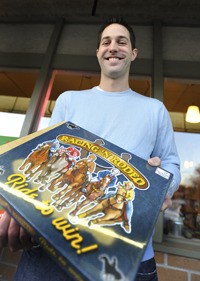David Rohrbacher remembers being part of the first assembly-line crew for the Weekend Farmer board game, which his father, George, created more than 30 years ago on the family’s farm near Goldendale.
David was only 3, but old enough to join the rest of the family to cut up sheets of play money and cards, apply rubber bands and place them in boxes for shipment.
Now, the game, which can be fun but has always been more of an educational tool than frivolous entertainment, is still going strong with sales of more than 600,000 since its inspired creation and hurried production occurred in the summer and fall of 1979.
Rohrbacher eventually left the game behind in the sense that he grew up, went away to college, became a college basketball coach, married, reconsidered the transient life of coaching, then decided with wife Holly to settle down on Bainbridge Island and have a family (two young boys).
But he returned to his roots several years ago when he took over the family business, though his mother, Ann, still serves as The Weekend Farm Co.’s bookkeeper and manages its warehouse in Goldendale.
Since his return, the family business has expanded with the creation of four additional board games (“The Farming Game for Kids,” “The Construction Game,” “Racing ‘N Rodeo” and “Trailer Wars”) and more recently, three card games for kids.
“We need to continue to expand with the new games,” Rohrbacher said. “The farming game has been around a long time and has a good life to it, but the card games are less expensive and provide more opportunity for different markets. And they are easier to sell at $13.95 than the board games (ranging in cost between $23.95 and $34.95).”
He said the next step is to “move out of our niche a little. We’ve taken on distribution of a handful of other small board-game companies and were looking at the distribution and licensing of other games.”
But everything still spins off of the farming game.
It surprises even Rohr-bacher that the company, which has had annual gross sales of up to $400,000 in recent years, has stayed afloat for so long.
“There aren’t many like us that have been around this long,” said Rohrbacher, who supplements his income as a financial advisor. “Most of them, especially those with only one game, either disappear or are successful enough to have someone else buy them.”
It’s a testimony, he said, to his father’s ingenuity.
His parents were first-generation farmers who were on the brink of losing their farm (raising cattle and grassland crops) during the economic downturn in the late 1970s.
George Rohrbacher told some friends he was thinking about writing a book on the educational aspect of farming (he eventually wrote two), but they told him he could make more money and have more fun creating a game about it.
“In 36 hours, literally, he had a prototype in his head and he started working on it that summer,” Rohrbacher said. “He had a graphic artist do a logo and all that, found a manufacturer for the different parts and then we all went to work in the basement assembling the pieces and boxing them. It has always been a family business. He started selling the games (wholesale) in November and they were in stores by Christmas.”
The game is based on the dilemma of a prototype small-time farmer, who has a job in town and works 20 acres with a credit line at the local bank. The board represents a calendar year and the market price for the crops (hay and grain) are determined by a roll of the dice. The goal is to eventually get $250,000 in equity in the farm, which allows the winning player to quit the part-time job and farm full time.
“Sometimes I still can’t believe that he created a game for one of the most-downtrodden industries in the state and it’s been successful,” Rohrbacher said. “But people are proud of their heritage. And the game is representative of that.”
It helps that it has an educational concept that is adaptable for kids (3 to 9) and adults. Parents like the kids’ version because it is based on reality, not fantasy as are many modern games.
Nancy Ward, Calico Cat’s store manager, said the kids’ game is popular because it can be played at three different levels.
“It teaches basic skills for the younger kids and then more difficult math skills at the higher levels,” she said. “It helps children learn the concept of where our food comes from, starting with the people who raise it and all the way to the market where it’s sold.”
She said that both farming games “are very popular and just fly off the shelf.”
The adult game has been used in many schools, vocational classrooms and colleges, including by a professor in the Midwest who has created a spread sheet that uses the game to teach accounting concepts and business management. Plus, there are social studies lesson already contained in the game’s basic structure.
It’s the game that keeps on giving, especially to the family that created it.
Rohrbacher hopes to someday earn enough income from it to leave his supplemental job behind.
“It would be a lot less stressful,” he said.
Like father, like son.


